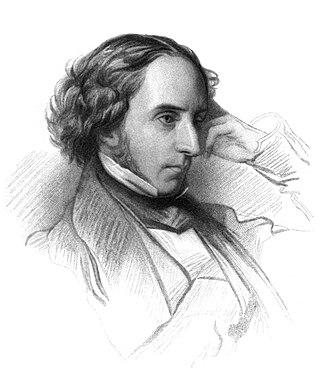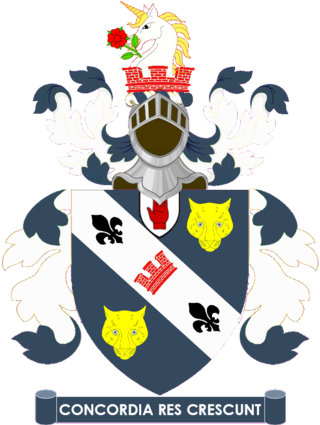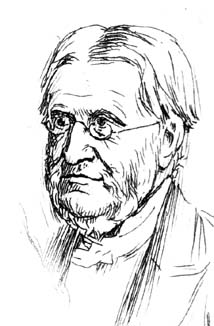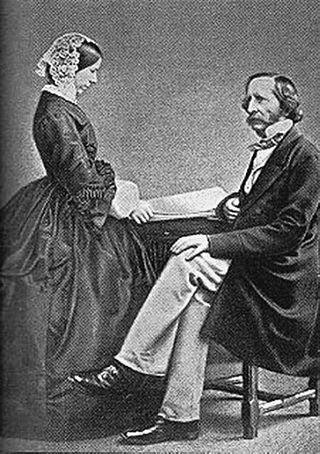Arms
 |
|
Sir Edward Thomas ffrench Bromhead, 2nd Baronet FRS FRSE (26 March 1789 – 14 March 1855) was a British landowner and mathematician, best remembered as patron of the mathematician and physicist George Green and mentor of George Boole.
Born the son of Gonville Bromhead, 1st Baronet Bromhead (grandfather of the British second in command of the same name at Rorke's Drift) and Lady Jane ffrench, Baroness ffrench, in Dublin. [1] [2] Bromhead was educated at the University of Glasgow and later at Caius College, Cambridge ( B.A. 1812, M.A. 1815) before taking up the study of law at the Inner Temple in London. [1] He was elected a Fellow of the Royal Society in 1817. Returning to Lincolnshire, he became High Steward of Lincoln. He became the 2nd Bromhead baronet, of Thurlby Hall in 1822.
While at Cambridge, Bromhead was a founder of the Analytical Society, a precursor of the Cambridge Philosophical Society, [3] together with John Herschel, George Peacock and Charles Babbage, with whom he maintained a close and lifelong friendship. While he was, by all accounts, a gifted mathematician in his own right (although ill-health prevented him from pursuing his studies further), his greatest contribution to the subject is at second hand: having subscribed to the first publication of self-taught mathematician and physicist George Green, he encouraged Green to continue his research and to write further papers (which Bromhead sent on to be published in the Transactions of the Cambridge Philosophical Society and those of the Royal Society of Edinburgh).
Bromhead repeated his success by encouraging the young George Boole from Lincoln. Bromhead was President of the Lincoln Mechanics Institute in the Lincoln Greyfriars, where George Boole's father was the curator. Boole first came to public notice when he gave a lecture on the work of Sir Isaac Newton on 5 February 1835. [4] The young Boole's development was fed by books that Bromhead supplied. [5]
Bromhead lost his sight when he was old and he died unmarried at his home of Thurlby Hall in Thurlby, North Kesteven on 14 March 1855. [5]
 |
|

Charles Babbage was an English polymath. A mathematician, philosopher, inventor and mechanical engineer, Babbage originated the concept of a digital programmable computer.

George Boole Jnr was a largely self-taught English mathematician, philosopher and logician, most of whose short career was spent as the first professor of mathematics at Queen's College, Cork in Ireland. He worked in the fields of differential equations and algebraic logic, and is best known as the author of The Laws of Thought (1854), which contains Boolean algebra. Boolean logic, essential to computer programming, is credited with laying the foundations for the Information Age alongside the work of Claude Shannon.

Sir John Frederick William Herschel, 1st Baronet was an English polymath active as a mathematician, astronomer, chemist, inventor and experimental photographer who invented the blueprint and did botanical work.

Sir George Everest, was a British surveyor and geographer who served as Surveyor General of India from 1830 to 1843.
The Analytical Society was a group of individuals in early-19th-century Britain whose aim was to promote the use of Leibnizian notation for differentiation in calculus as opposed to the Newton notation for differentiation. The latter system came into being in the 18th century as a convention of Sir Isaac Newton, and was in use throughout Great Britain. According to a mathematical historian:
George Green was a British mathematical physicist who wrote An Essay on the Application of Mathematical Analysis to the Theories of Electricity and Magnetism in 1828. The essay introduced several important concepts, among them a theorem similar to the modern Green's theorem, the idea of potential functions as currently used in physics, and the concept of what are now called Green's functions. Green was the first person to create a mathematical theory of electricity and magnetism and his theory formed the foundation for the work of other scientists such as James Clerk Maxwell, William Thomson, and others. His work on potential theory ran parallel to that of Carl Friedrich Gauss.

Sir William Molesworth, 8th Baronet, was a Radical British politician, who served in the coalition cabinet of The Earl of Aberdeen from 1853 until his death in 1855 as First Commissioner of Works and then Secretary of State for the Colonies.

Sir George Clerk of Pennycuik, 6th Baronet was a Scottish politician who served as the Tory MP for Edinburghshire, Stamford and Dover.

Robert Leslie Ellis was an English polymath, remembered principally as a mathematician and editor of the works of Francis Bacon.
Bromhead or de Bromhead may refer to:
Events from the year 1789 in Ireland.
Events from the year 1855 in Ireland.

The Bromhead Baronetcy, of Thurlby Hall in the County of Lincoln, is a title in the Baronetage of the United Kingdom. It was created on 19 February 1806 for the soldier Lieutenant-General Gonville Bromhead. His eldest son, the second Baronet, was a mathematician. He died unmarried and was succeeded by his younger brother, the third Baronet. He was a Major in the Army and fought at the Battle of Waterloo. His eldest son, the fourth Baronet, was a Colonel in the Indian Staff Corps. He was succeeded by his grandson, the fifth Baronet. He was a Lieutenant-Colonel in the Indian Army. As of 2007 the title is held by his son, the sixth Baronet, who succeeded in 1981. However he does not use his title.

Archibald Smith of Jordanhill was a Scottish barrister and amateur mathematician.

Philip KellandPRSE FRS was an English mathematician. He was known mainly for his great influence on the development of education in Scotland.

Augustus De Morgan was a British mathematician and logician. He is best known for De Morgan's laws, relating logical conjunction, disjunction, and negation, and for coining the term "mathematical induction", the underlying principles of which he formalized. De Morgan's contributions to logic are heavily used in many branches of mathematics, including set theory and probability theory, as well as other related fields such as computer science.

Sir Walter Calverley Trevelyan FGS FRSE was an English naturalist and geologist.
Henry Parr Hamilton was a Scots-born clergyman and mathematician, who was Dean of Salisbury for 30 years.

Lieutenant-General Sir Gonville Bromhead, 1st Baronet was a British soldier who served in the Saratoga Campaign during the American Revolutionary War and fought against the Irish Rebellion of 1798.

The Lincoln Mechanics' Institute or Lincoln and Lincolnshire Mechanics' Institute was founded in Lincoln, England in 1833. It was one of the many Mechanics' institutes which sprang up in the early 19th century and was the first Mechanics' Institute to be founded in Lincolnshire.
{{cite journal}}: CS1 maint: multiple names: authors list (link) Mentions Bromhead's role in the career of George Green.